Universities | Page 2
Gamification Information Technology Librarianship
Project report to the Knight Foundation: Indie games for libraries
Olivier Charbonneau 2015-11-30
Aussi en français: http://www.culturelibre.ca/tag/knight/
Follow the evolution of this project here: http://outfind.ca/tag/knight/
I am very happy to report that the project report for the indie games licensing project is now available on the Technoculture Art & Games research center’s blog. 
Blended Learning Information Technology Presentation Software
Preferences toward screencasting
Olivier Charbonneau 2015-11-20
Here is an the abstract of an interesting article looking at student prefeferences between lecture capture versus screencasting published in the International Journal of E-Learning and Distance Education:
Students’ Preferences for Types of Video Lectures: Lecture Capture vs. Screencasting RecordingsAlaa Sadik
Abstract
The use of online videos as a supplement to traditional lectures or as a way to reach students at remote sites has become increasingly popular in higher education. Faculty and university technology centers have focused on approaches to recording and distributing online video lectures over the last ten years. Regardless of learning outcomes, the purpose of this study was to investigate students’ preferences for lecture capture and screencasting recordings as a supplement to classroom lectures. A questionnaire about video lecture format preferences was used to collect data about students’ preferences in two courses over a three-year period. The overall findings indicated that the majority of students rated screencasting recordings as better than lecture capture recordings in many aspects of video quality and usefulness. Factors affecting students’ preferences for screencasting and the implications of this preference have been reported.
Gamification Research
Indie Games Licensing for Libraries Presentation
Olivier Charbonneau 2015-07-17
Aussi en français: http://www.culturelibre.ca/tag/knight/
Follow the evolution of this project here: http://outfind.ca/tag/knight/
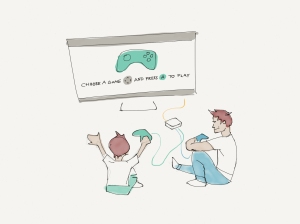
Here is the presentation I will be delivering to the Knight Foundation about the Indie Games Licensing for Libraries project.
This slide explains the main idea behind the project, namely connecting indie developers with libraries through a series of copyright contracts, also called licenses:
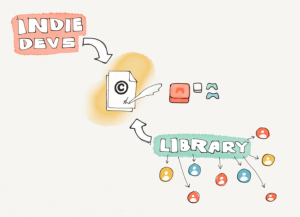
Blended Learning Open education
Cheap and cheerful instructional videos
Olivier Charbonneau 2015-07-03
I have been trying out and testing different models to create instructional tutorials for the past few years. I provided an account of my last iteration in a post on this blog, called “Anatomy of a YouTube Tutorial” and “My gear to record a session“. I think I may have figured out a better way to do this, essentially optimizing the production cycle of the videos.
The gist of my most recent idea is still to use QuickTime on my Mac, an ancient MacBook Pro, but with a twist. Remember that QuickTime allows you to record the screen as well as make a video directly from your Mac using the on board camera and mic (I bought a self standing USB mic because the on broad mic sucks).
In that sense, I launch QuickTime and select File > New video. A window opens where I see myself in front of my Mac. I place this window in the corner of my screen and position my browser on the left and I fill the gap on the top right corner with a text file where I can place information (such as the outline of the talk).
The idea is to then launch File > New Screen Recording and the screen recording catches the “mirror image” of the video on the corner of my screen (I never actually record the video of my face, I just use the image of it in the corner).
Here is what the screen looks like:
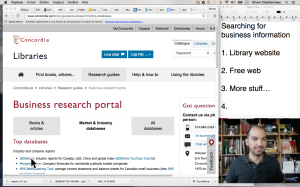
The point here is that I can generate one simple video file with 3 screens on it: a browser (or any other document), a text file (or any other filler information (actually, this could be a PPT, a script or anything really) and my face.
The only issue is that the table I use is not super stable and my laptop screen tends to wobble if I am not delicate in typing or putting my hands on the table. But this seems like a way to generate tutorials with minimal editing required..
Gamification Information Technology Outfind.ca
Meet Alice, the first digital gaming kit for libraries
Olivier Charbonneau 2015-06-04
Aussi en français: http://www.culturelibre.ca/tag/knight/
Follow the evolution of this project here: http://outfind.ca/tag/knight/
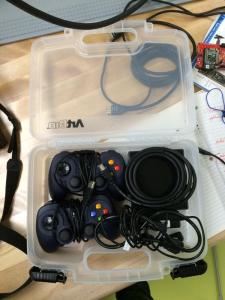
Alice is the codename for the first prototype digital gaming kit for libraries
Above is a picture of our prototype, codename Alice for a few reasons:
- it is our “alpha” or A prototype;
- Alice, in encryption circles, tries to talk to Bob; and
- it is a “clin-d’oeil” to Lisa, Apple’s first computer with a graphical interface and my favorite character on the Simpsons
Many many thanks to the Knight Foundation for their wonderful support !!
My team of engineers are working hard on building a functioning prototype. We have selected a “stripped down” Linux distribution running Kodi as a platform. We picked some generic controllers, a hard plastic case and a mini-computers running on solid state memory (the Gygabyte Brix in fact).
They will hopefully deliver a first version of the device by late June. We will also deliver all our code via the usual open source venues (not sure which actually, but my team is keen on contributing their work back to the community quickly).
Afterwards, my team and I hope to visit with 2 public library systems: Montreal and Austin public libraries. We aim to discuss this project with library employees (administrators, professionals and staff), game developers and patrons. I have ethnographers working on our research instruments.
So, my team is busy with the work our grant has funded and we should have some tangible results in a month or so.
Please let me know if you have questions, ideas or comments, I am most interested in them! My email is: o.NOSPAMcharbonneau@concordia.ca (note to humans: please remove all capital letters from my email address to reach me).
Gamification Librarianship
Legacy Video Game Collection Simulator
Olivier Charbonneau 2015-06-01
I’ve been toying with documenting a burgeoning video/digital game collection for my institution. I took a stab at establishing some costs and space considerations for various assumptions. For example, average cost and sizes for consoles, controllers and games from years past… I’ve tried to capture some of the metrics and data I’ve gathered in this spreadsheet: Legacy Video Game Collection Simulator.
For the record, a legacy game collection implies physical objects embedded with digital media which are no longer commercially available.
(Special thanks to Darren Wershler, professor at Concordia University in Montréal, for his assistance in this project.
With it, you can modify the cost & size assumptions and generate model collections. Of course, it does not specify which exact consoles you would acquire for your collection, but it allows to generate some models one would plan budget or space requirements.
Please let me know if you have comments or questions!
Gamification
What about games in academic libraries?
Olivier Charbonneau 2015-04-15
Reading up on the subject of games in academic institutions
Scholarly articles & papers (slightly disorganized)
- Tappeiner, Elizabeth & Catherine Lyons, (2008) “Selection criteria for academic video game collections“, Collection Building, Vol. 27 Iss: 3, pp.121 – 125
- Kane, Danielle, Soehner, Catherine and Wei, Wei. “Building a collection of video games in support of a newly created degree program at the University of California, Santa Cruz” Science & Technology Libraries. Vol. 27 (4) 2007: 77-86
- Laskowski, Mary and Ward, David. “Perspectives on building next generation video game collections in academic libraries”. Journal of Academic Librarianship. Vol. 35 (3) May 2009: 267-273.
- Nicholson, Scott, 2013, “Playing in the Past: A History of Games, Toys and Puzzles in North American Libraries”, Library Quarterly 83(4), 341-361, available from: http://scottnicholson.com/pubs/playinginthepast.pdf
- (looks like a paper) New Directions for Academic Video Game Collections: Strategies for Acquiring, Supporting, and Managing Online Materials by Diane Robson and Patrick Durkee, University of North Texas
- Christopher M. Thomas, Jerremie Clyde, Game as Book: Selecting Video Games for Academic Libraries based on Discipline Specific Knowledge, The Journal of Academic Librarianship, Volume 39, Issue 6, November 2013, Pages 522-527, ISSN 0099-1333, http://0-dx.doi.org.mercury.concordia.ca/10.1016/j.acalib.2013.07.002.
(http://0-www.sciencedirect.com.mercury.concordia.ca/science/article/pii/S0099133313000888)
Keywords: Video games; Collections; History; Academic libraries
- A Unified Approach to Preserving Cultural Software Objects and their Development Histories, Kaltman, Eric, UC Santa Cruz; Wardrip-Fruin, Noah, UC Santa Cruz; Lowood, Henry, Stanford; Caldwell, Christy, UC Santa Cruz
News, blog posts & other documents (by date)
[youtube https://www.youtube.com/watch?v=gOonDY8vCJU&w=560&h=315]
- Playing loud in quiet spaces, Kill Screen, March 31st 2015
- Gaming reaches into far corners of academic world as U of C builds huge collection, Chris Nelson, For The Calgary Herald, Published on: March 16, 2015
- Virginia Commonwealth U Libraries launches collection of critically acclaimed video games By Brian McNeill University Public Affairs, Thursday, Nov. 6, 2014
- Taking Games in Libraries Seriously Posted on July 24, 2014 by Andy Burkhardt: Covers collecting (funding, buy-in, access, space, scope) as well as instruction issues.
- More than Mario Kart: games and game-based learning at Carleton University Library (AccessOLA, 2013)
- Videogame collection supports scholarly study Posted on May 25, 2012 by Patrick Jagoda, Assistant Professor, Department of English, University of Chicago
- New video game library (U Calgary, September 23, 2010)
- Got Game? Check Out What the Stanford Libraries Have, by Henry Lowood, April 12, 2006
Library Research guides
Projects and initiatives (hat tip to Christy Caldwell)
Assessment Inspiration
DIY User feedback kit for the Indie games licensing for libraries project
Olivier Charbonneau 2015-03-05
Aussi en français: http://www.culturelibre.ca/tag/knight/
Follow the evolution of this project here: http://outfind.ca/tag/knight/
Last year’s Arcade 11 brought an interesting mix of librarians, indie games developers as well as games scholars. Through conversations and exchanges of views, it quickly emerged that libraries required alternative models to make independent games available through their digital collections.
Purchasing born-digital copyrighted materials is a strong and emerging trend in libraries worldwide, but “general public” methods of dissemination do not offer the licensing and technological terms libraries require (Libraries cannot acquire born-digital materials from iTunes, Google Play or Amazon as it contradicts the licensing terms of these systems).
In that sense, the TAG team have set out to devise various prototyping models for the licensing and circulation of independent video games at libraries. The Knight Foundation (thank you so much!!!) has funded the creation of a video game console, which the prototype will be devised using over-the-counter inexpensive micro-computer components (with assistance from District 3). We will tap into the pool of graduate studens to build a seed collection of games for libraries as well as articulate some key knowledge points all librarians should know about digital games. Finally, we expect to test whether libraries are open to the idea of having these consoles circulate to users of their library system.
One of our team members thought of getting on-the-fly feedback from parents & kids visiting Arcade 11, our TAG (games) research center open house today & tomorrow… This week is reading week in the Province of Québec, and most k-12 kids are on vacation, so parents scramble to find cool activities to do with their kids. This is the perfect opportunity to great feedback from people visiting our space at Concordia Univerisity in Montréal!
Here is the kit I scrambled together by raiding the supply cabinet…
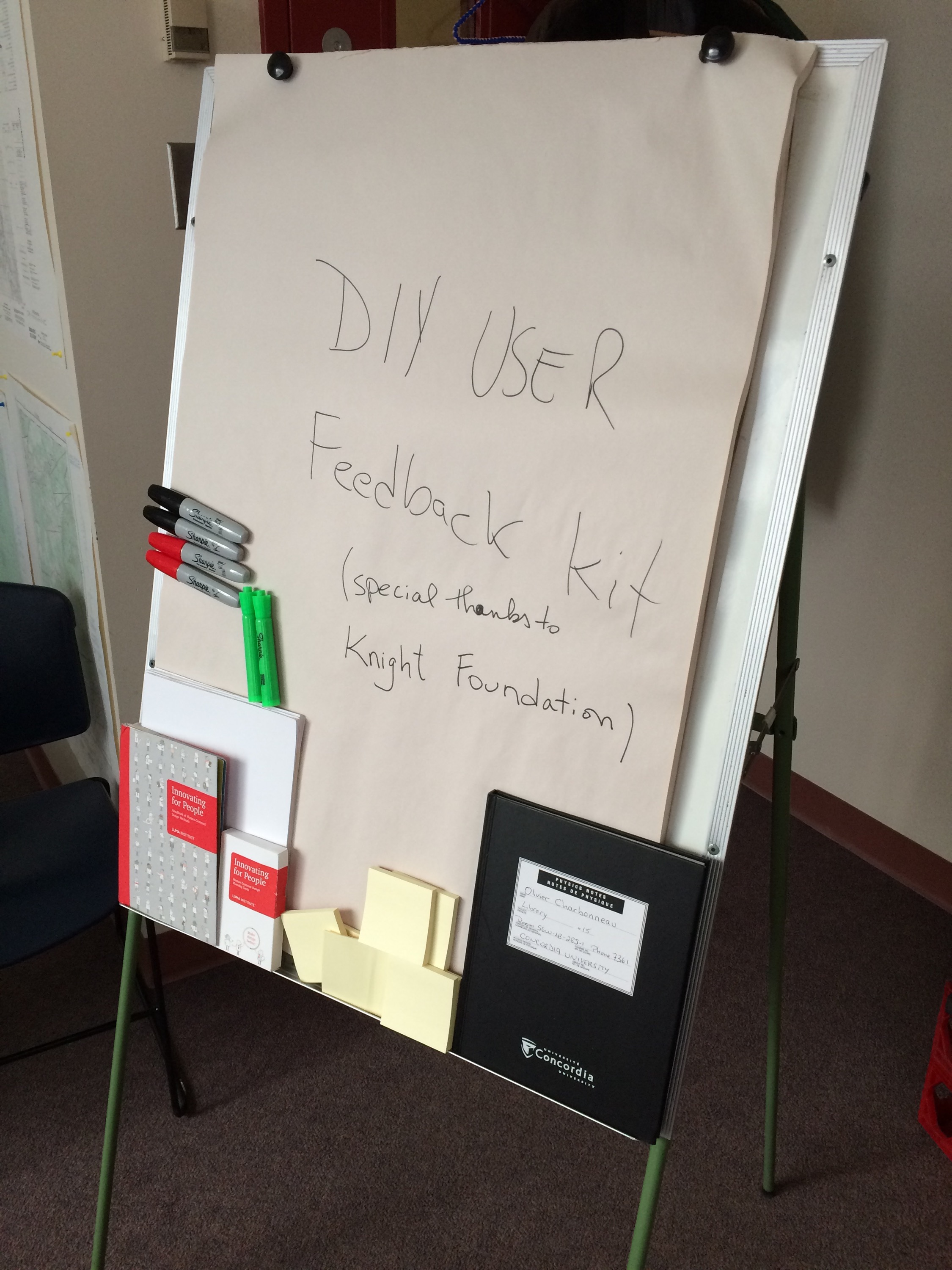
Also a pic of our concept prototype (version 0.1 or pre-pre-pre alpha) …
(Indie games licensing for libraries project)
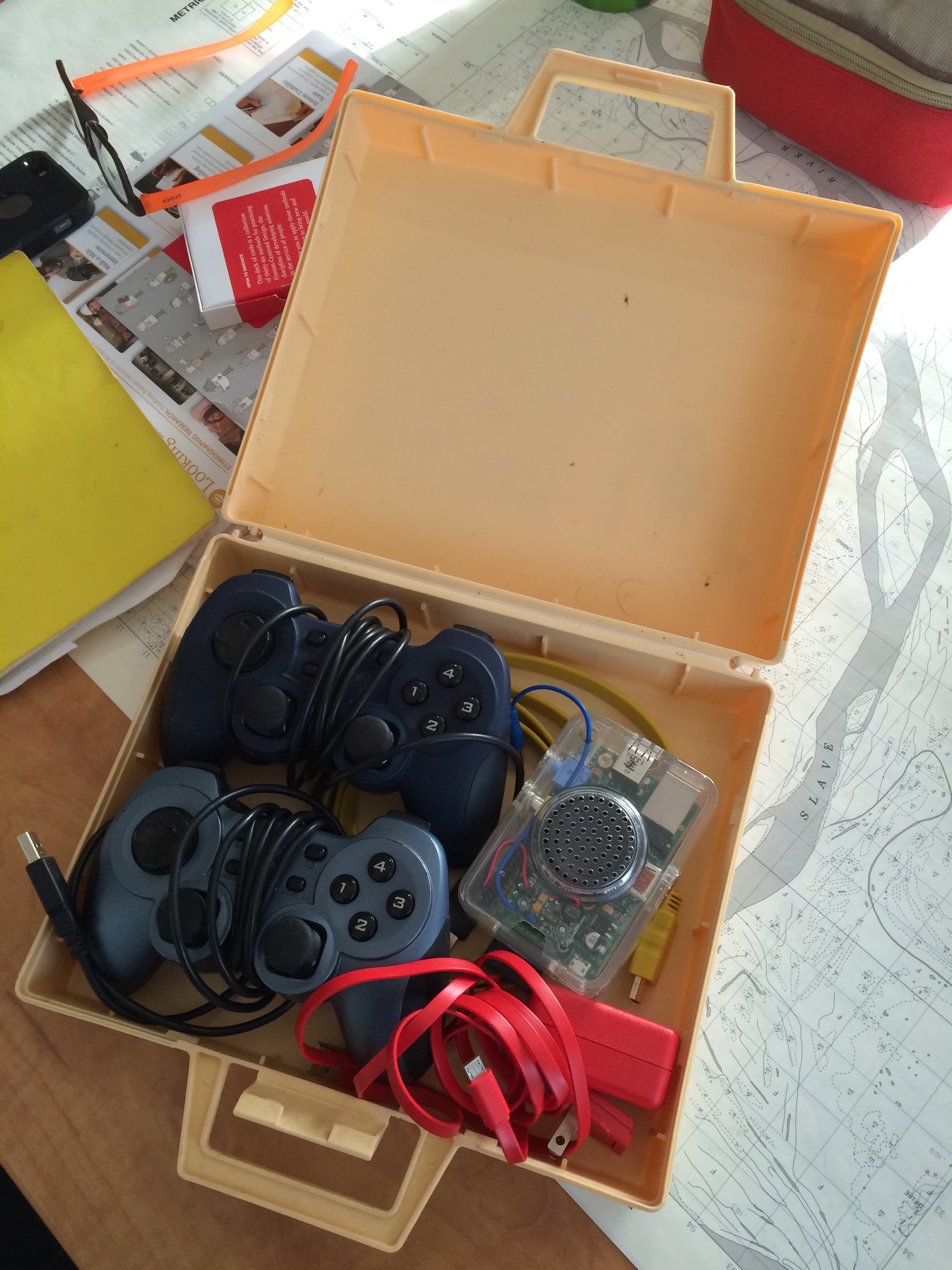
… some folks playing at Concordia U’s Arcade 11

Aussi en français: http://www.culturelibre.ca/tag/knight/
Follow the evolution of this project here: http://outfind.ca/tag/knight/
Academic Integrity
Harvard takes on academic integrity & plagiarism
Olivier Charbonneau 2015-02-23
I just saw this fly through my RSS feeds today, the Harvard College Writing Program has just launched the Harvard Guide to Using Sources.
From what I can see from interacting with this site for a few moments, it is a text heavy resource with some hyperlinked content, although it feels like one should go through the content sequentially.
Assessment
My suggested marking scheme for entrepreneurship
Olivier Charbonneau 2015-02-10









